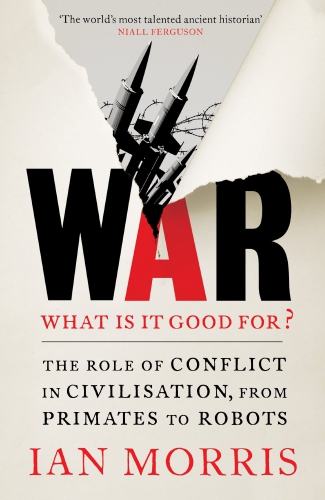War is good for absolutely nothing; it means "destruction of innocent lives" and "tears to thousands of mothers' eyes" – so go the lyrics of the classic 1970 pop hit. Ian Morris does not agree. War is essential to history, he argues in his new book. Only through warfare has humanity been able to come together in larger societies and thus to enjoy security and riches. It is largely thanks to the wars of the past that our modern lives are 20 times safer than those of our stone age ancestors.
 This proposition is not as startling or paradoxical as it might at first seem, especially as by "war" Morris means conquest or nation-building. Nor is it particularly original. Back in the 17th century, Thomas Hobbes set the ball rolling with his vision of life as nasty, brutish and short; much more recently, the Israeli historian Azar Gat has set out the evidence at length in his War in Human Civilization. Morris's book is essentially a popularisation of Gat's monumental, if forbidding work.
This proposition is not as startling or paradoxical as it might at first seem, especially as by "war" Morris means conquest or nation-building. Nor is it particularly original. Back in the 17th century, Thomas Hobbes set the ball rolling with his vision of life as nasty, brutish and short; much more recently, the Israeli historian Azar Gat has set out the evidence at length in his War in Human Civilization. Morris's book is essentially a popularisation of Gat's monumental, if forbidding work.
To prove his case, Morris reviews the history of warfare, carrying the reader confidently from bows and arrows to ballistic missiles, and sketching in the parallel development of social forms, from hunter-gatherer groups to the EU.
He is particularly good on the role of military innovation in the long process of European colonisation, which began in the 15th century and ended in 1914. His neat formula about the productive role of war works best for the classical period but falters by the time it reaches the 18th century, as ideology, high finance and diplomacy enter the equation. Morris's response is to bolt on extra elements – such as the model of global conflict produced by the geographer Sir Halford Mackinder in the 1900s – or simply to concentrate on the military narrative.
As in his Why the West Rules – for Now, Morris combines extraordinary erudition with light, manageable prose. He bestrides the oceans and continents, leaps nimbly across the disciplines, and works hard to keep the reader engaged. We learn that "if an elephant rampaged in the wrong direction, the only way to stop it from trampling friends rather than foes was for its driver to hammer a wooden wedge into the base of its skull"; that Robert Clive, after winning the Battle of Plassey in 1757, helped himself to a reward of £160,000 (about $400m in today's money); and that during the first world war, Britain and her allies spent $36,485.48 for every enemy soldier they killed, whereas Germany and her allies spent only $11,344.77 per corpse. As the success of Jared Diamond's books shows, there is now a huge public appetite for this sort of brew of history, anthropology, archaeology, evolutionary psychology and biology – particularly when served up as tastily and intelligently as it is by Morris.
What, though, does it all add up to? Big History of this kind is often more interesting for the cultural assumptions behind it than for its content: Hegel thought the function of history was to produce the Prussian state; Toynbee saw the hand of God everywhere. Morris is a typical modern academic: a materialist, but not a Marxist, with a strongly evolutionary approach. He favours geographical explanations, discounts the role of ideas and downplays the "western intellectual tradition".
So, when he gets to what he calls "probably the most important question in the whole of military history" – why did China not keep its early lead in firearms ? – he dismisses Victor Davis Hanson's argument that a longstanding western cultural stance towards rationalism, free inquiry and the dissemination of knowledge led Europe to forge ahead, and prefers the simpler answer that Europeans got good at guns because they fought a lot and that the topography of Europe encouraged its population to invest in guns.
Again, as an archaeologist, Morris takes the long view and a rigorously quantitative approach. This means that he can dismiss Hitler, the Holocaust and the second world war as minor blips in the real story of the 20th century – the quantum leap in living standards and life expectancy. So what if 50 million died? That is a tiny amount compared to the growth in the Chinese population over this period.
Which, some people might think, only goes to show that the quantitative approach is intellectually worthless. What is more, some of Morris's quantitative assertions don't bear close scrutiny; as he himself concedes, the statistical evidence for the violence of early society is based on impressionistic evidence and fraught with methodological difficulties.
In his conclusion Morris speculates on the future of warfare when the current Pax Americana runs out. I wish I shared his faith that "the computerisation of everything" will make war redundant.





 del.icio.us
del.icio.us
 Digg
Digg
Les commentaires sont fermés.